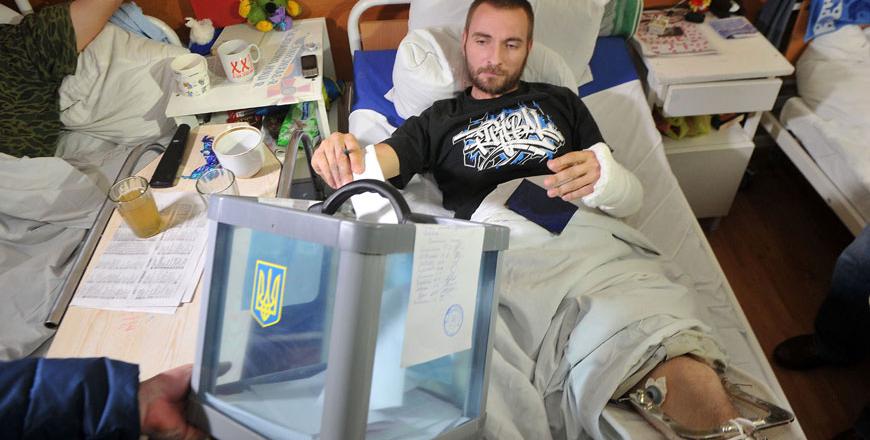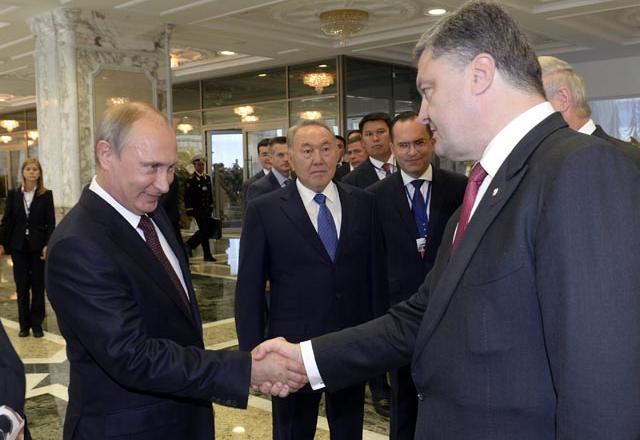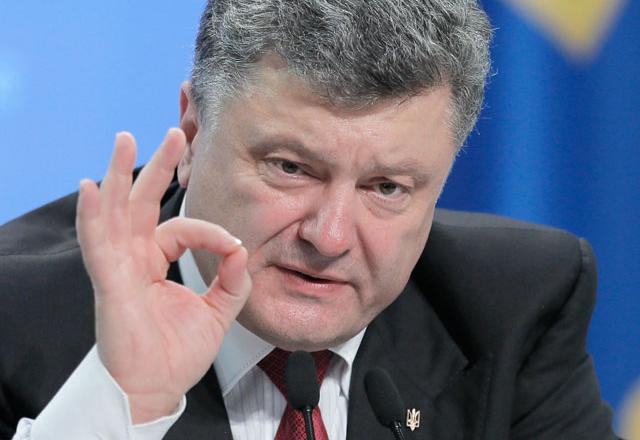You are here
Decisive Ukraine polls marred by cancelled vote in key port
By AFP - Oct 25,2015 - Last updated at Oct 25,2015

A Ukrainian serviceman, wounded on the east of the country, casts his ballot in a military hospital of the northeastern Ukrainian city of Kharkov on Sunday during the country’s local elections (AFP photo)
KIEV — Western-backed Ukrainian President Petro Poroshenko's fragile ruling coalition faced a major survival test Sunday in local elections that were instantly marred as voting was cancelled in the strategic Port of Mariupol.
Polling stations opened across all Kiev-administered regions accept for Mariupol — a southeastern city of nearly 500,000 that provides a land bridge between pro-Moscow rebel regions and Ukraine's Russian-annexed Crimea peninsula.
A statement from Poroshenko's Solidarity Party said the polls "were aborted... due to the improper preparation of election ballots, the absence of control over their printing and number, and reliable storage”.
Poroshenko's party said it still hoped to conduct mayoral and regional council votes in the city in the coming weeks.
But the locals were angry and blamed the pro-Western authorities in Kiev for the abrupt disruption.
"It seem that someone wants the city to remain rudderless and without proper authorities," said 90-year-old Olena Kholodenko after being turned away at the polling station door.
The combative elections come during a lull in fighting and with worries growing that Ukraine is slipping off the global radar despite just turning into Europe's second-poorest country and still standing as a bulwark against Russia's feared expansion west.
But politicians in Ukraine were most concerned about what happens in Mariupol — a vital outlet for the east's industrial output that had militias stationed on its northeastern outskirts throughout most of the war.
The devastated city came under a January 24 mortar and rocket attack monitors blamed on the insurgents that killed 31 civilians and wounded more than 100.
The collapse of Poroshenko's bickering ruling alliance could have grave consequences that could not only result in the eventual dissolution of parliament but also derail Kiev's plans of applying for EU membership by 2020.
Twenty months have passed since the ex-Soviet nation sparked the world's imagination through unceasing protests that ultimately toppled a despised Kremlin-backed leader and appeared to anchor Ukraine's future with the West.
But Russia's subsequent seizure of Crimea and the pro-Moscow eastern revolt that followed in which more than 8,000 died have seen the nation of 40 million stripped of its most strategic naval bases and industrial heartland.
The popularity of Poroshenko's government has plunged because of this year's drastic utility bill hikes and other belt-tightening measures prescribed by world lenders under their $40 billion (36 billion euro) economic rescue loan.
And Poroshenko's seeming inability to sideline a handful of influential tycoons has seen his own ratings slip to less than half of what they were when he became president in May 2014.
The party of Prime Minister Arseniy Yatsenyuk — a top Poroshenko partner who won October's parliamentary vote — has seen his approval languishing, hovering near zero and is fielding no candidates.
Frustration at the West's refusal to arm Ukrainian forces and only provide tightly regulated financial help has further bolstered the election odds of the marginalised but militant far right.
Polls show that pro-Russian groups — active in Mariupol — are also gaining momentum because of Kiev's effective economic blockade of rebel-run regions in which an estimated 3.5 million people still live.
"We need a domestic coalition that will ruin Putin's ambition of blowing our country apart from the inside," Poroshenko said on one recent campaign stump
Poroshenko's confident promise the day after his presidential triumph to stamp out the insurgency within a matter of days has also done little to help his cause.
The separatist parts of the Russian-speaking Lugansk and Donetsk regions are not only boycotting the polls but also planning their own for early next year.
The insurgents intend to bar pro-Kiev candidates from their elections and accuse Poroshenko of "genocide".
The demoralised mood of voters has been picked up by an astounding 132 parties — many of them using boastful slogans and colourful characters to draw in the media and prompt endless TV debates.
The Opposition Party — built from the ashes of the toppled Moscow-backed leadership — has peppered the streets with posters promising "Prosperity and Peace".
Former 2004 pro-democracy Orange Revolution leader and ex-premier Yulia Tymoshenko is demanding a "professional army and fair tariffs".
The fiery and divisive political survivor is expected to do better than her Fatherland Party's disappointing sixth place showing in last year's parliamentary vote.
Related Articles
The presidents of Russia and Ukraine hold key talks Tuesday with little hopes for a breakthrough in resolving the raging conflict pitting Kiev against pro-Moscow separatist rebels.
KIEV — Ukraine's parliament on Thursday appointed pro-Western speaker Volodymyr Groysman as prime minister in a bid to end months of politic
President Petro Poroshenko on Thursday proclaimed an end to the "most dangerous" part of Ukraine's pro-Russian uprising and the start of a post-war recovery that would lead to an EU membership bid in 2020.



















